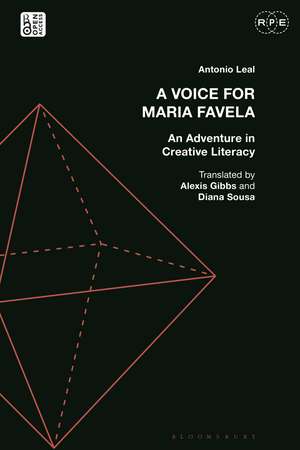A Voice for Maria Favela: An Adventure in Creative Literacy: Radical Politics and Education
Autor Antonio Leal Traducere de Alexis Gibbs, Elaine Chaseen Limba Engleză Paperback – 29 mai 2024
| Toate formatele și edițiile | Preț | Express |
|---|---|---|
| Paperback (1) | 188.55 lei 6-8 săpt. | |
| Bloomsbury Publishing – 29 mai 2024 | 188.55 lei 6-8 săpt. | |
| Hardback (1) | 566.35 lei 6-8 săpt. | |
| Bloomsbury Publishing – 16 noi 2022 | 566.35 lei 6-8 săpt. |
Preț: 188.55 lei
Preț vechi: 247.86 lei
-24% Nou
Puncte Express: 283
Preț estimativ în valută:
36.09€ • 39.22$ • 30.34£
36.09€ • 39.22$ • 30.34£
Carte tipărită la comandă
Livrare economică 21 aprilie-05 mai
Preluare comenzi: 021 569.72.76
Specificații
ISBN-13: 9781350247611
ISBN-10: 1350247618
Pagini: 136
Ilustrații: 10 bw illus
Dimensiuni: 156 x 234 x 25 mm
Greutate: 0.2 kg
Editura: Bloomsbury Publishing
Colecția Bloomsbury Academic
Seria Radical Politics and Education
Locul publicării:London, United Kingdom
ISBN-10: 1350247618
Pagini: 136
Ilustrații: 10 bw illus
Dimensiuni: 156 x 234 x 25 mm
Greutate: 0.2 kg
Editura: Bloomsbury Publishing
Colecția Bloomsbury Academic
Seria Radical Politics and Education
Locul publicării:London, United Kingdom
Caracteristici
2.Includes a substantial introduction written by the translator Alexis Gibbs (University of Winchester, UK) and preface by Inny Accioly (Fluminense Federal University, Brazil)
Notă biografică
Antonio Leal is a Brazilian educator and educational theorist.Alexis Gibbs (Translator) is Senior Lecturer in Education Studies and Liberal Arts at the University of Winchester, UK.
Cuprins
Preface by Inny Accioly (Fluminense Federal University, Brazil)Translator's Introduction, Alexis Gibbs (University of Winchester, UK)1. (Author's) Introduction2. March of '813. Play4. Games5. Methods6. Family7. Special Education8. The Pupil9. Didactics10. Community11. The Civic12. The Cliché13. Murals14. A Civil Intervention15. The Maid16. Sickness/Hunger/Madness17. Violence18. PoliticsReferencesIndex
Recenzii
I read this book in two sittings and was enthralled throughout. First, the translation is very fluid-it reads with verve, depth, and fluidity. The translators have captured a voice and rendered it clearly for English readers. The book itself is something of a revelation for critical education or anyone interested in the tradition following Paulo Freire. One of the central questions of Freire's oeuvre is how does this politically-informed, radically democratic method apply to children and special education methods. Another is the sheer readability of Freire, whose use of theory can sometimes confound readers in teacher education courses. Leal solves both these problems: his text is explicitly methods-based, showing every detail of how he approached his transformative coursework, which will shock and transform educators' presumptions about pedagogy. It is practical to the extreme while maintaining the same analysis and radical approach of Freire. Finally, it is entoxicatingly readable, vulnerable, and relatable to anyone without technical academic training.
A Voice for Maria Favela offers a concrete and inspiring example of how to overcome prejudices over low class community of students: it shows the political and aesthetical educational life that emerges when an educator does not underestimate the creative power of any human being.
A Voice for Maria Favela offers a concrete and inspiring example of how to overcome prejudices over low class community of students: it shows the political and aesthetical educational life that emerges when an educator does not underestimate the creative power of any human being.









